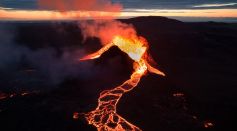ENVIRONMENT & CLIMATE

Volcanoes Provide Earth's Atmosphere First Oxygen 100 Million Years Earlier Than Great Oxidation Event

Perfect Shape of Eggs and Its Universal Equation Identified for the First Time; Geometrical Feature Applicable to Food Industry and Other Scientific Disciplines
Dead Whale Being Feasted on by Great White Sharks Captured on Video; Watch Footage of the Cape Cod Occurrence
Fukutoku-Okanoba Eruption: NASA Shares Incredible Satellite Images of Japan’s Underwater Volcano From 80 Feet Underneath the Surface
Fire Island Reef: Expanded, Stronger After 55-Foot Steel Luxury Vessel Sank Purposefully

Ida Hitting Louisiana on Hurricane Katrina’s 16th Anniversary; Storm to Bring Heavy Rains and Could Turn Into an Extremely Dangerous Category
From Maritime Folklore to Science: Satellites Monitor Milky Seas Effect, Bacteria Not Mermaids Create Luminous Water

Present-Day Space Race Among Space Agencies, Firms Like SpaceX Could Affect Earth's Atmosphere; Space Tourism Not Efficient
Greenland Sharks Live Hundreds of Years; Can These Sharks Teach Humans How to Live Long?
Retinoids Responsible for Suitable Development of Plant Roots, Animal Embryos
New Whale Species Discovered in Egypt: 10-foot P. anubis Semi-Aquatic Walking Whale Lived as Top Predator 43 Million Years Ago
Pterosaur Fossil Recovered During Police Raid; Specimen Analysis Offers New Insight Into the Flying Reptile's Foraging Style
Montreal Protocol Unexpectedly Saved Earth From Significant Climate Change; What Does It Mean?
7,200-Year-Old Young Female Skeleton Discovered in Indonesian Island; ‘Toaleans’ New Type of Ancient Human Seen in Fetal Position
Most Popular

Faster Than Light Travel: How Warp Drive Physics and Relativity Challenge the Limits of Space Travel

Why Mosquitoes Target Some People More Than Others: Science Behind Attraction and High-Risk Profiles

CES 2026 Health & Wellness Tech That Are Changing Science

Earth vs Super-Earth Planets: A Deep Earth Comparison With Nearby Exoplanets




